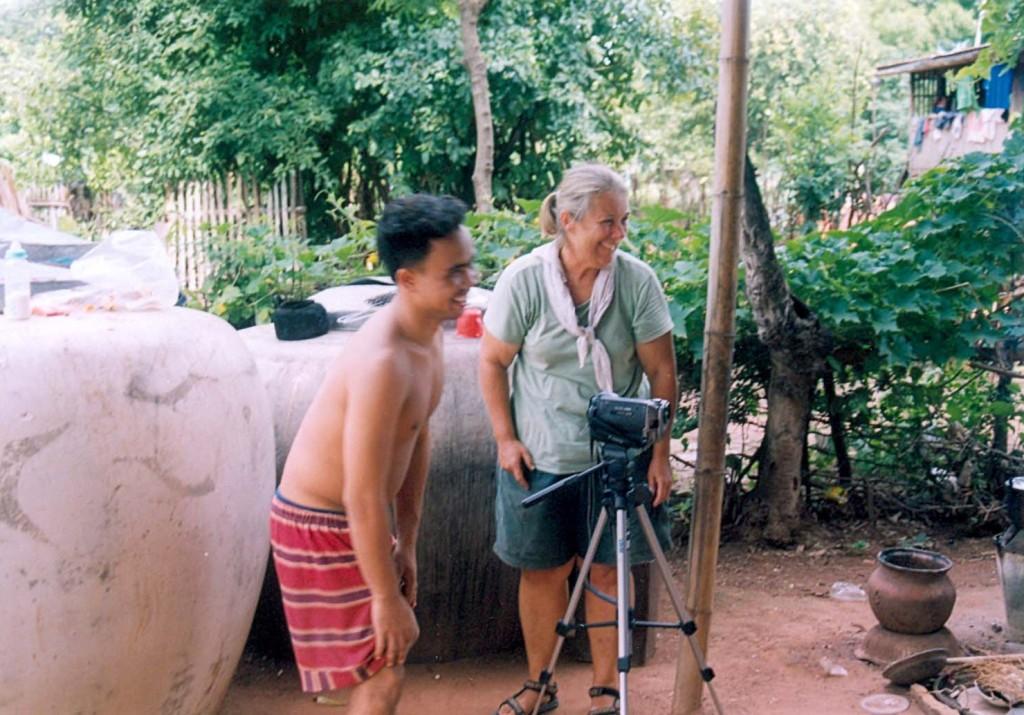Professor uses knowledge from travels to share stories
While on a leave of absence from one of her jobs at various firms on Wall Street, NKU Associate Professor of Anthropology Judy Voelker took an opportunity that would ultimately change her career path.
“When I lived in New York and when I was working on Wall Street, I was able to travel extensively and I hadn’t had that experience growing up,” Voelker said. “That actually changed my mind set. It was as if there was a world I didn’t know about.”
During these travels, she made her first visit to Asia and quickly discovered her fondness for the continent because of its architecture and unique cultural heritage. Especially Thailand and Southeast Asia, which would become her anthropological specialty.
“It was so different than anything I’d seen,” said Voelker enthusiastically with a reminiscent glow in her eye beyond her black rimmed glasses.
Ban Thakhok
These various leave-of-absence trips inspired her to apply to graduate school in Buffalo, N.Y., and leave her Wall Street job. Voelker won a Fulbright Fellowship merit grant and got to live in Ban Thakhok, a small village in Northeast Thailand, for almost two years. She said the exposure to rural village living was an eye-opening experience after growing up in the suburbs.
“I was the only westerner in that village. Many at that time had never seen a white person,” Voelker said. “Everyone in that village knew you, even if they didn’t know you.”
The residents of the village wanted to know what was going on. They wanted to touch her skin and look at her lightly colored hair.
She enjoyed the experience of living in a new place as an uncomfortable unknown and slowly becoming part of the community. When she left, Voelker took away a sense of belonging to a larger group than family.
Six@Six Lecture
Some of the information collected in her research of this village was presented in her recent Six@Six Lecture at the Behringer-Crawford Museum in late September. “The lecture was called Ceramic Traditions of Southeast Asia: People, Community, and Pottery.”
“Part of the tradition with this manufacturing process is that women pass on how to make the pottery to their daughters and their daughter’s daughters. It’s a long-term tradition,” Voelker said.
The pots produced are called earthenware pots because they are not high temperature fire pots, according to Voelker. They are used for cooking soups, storing, and water containers.
The villagers have access to aluminum cookware and an array of modern dishes, but they prefer the earthenware pots because of the taste, said Voelker, which she described as very fragrant.
Students from her Museums in Contemporary Society class helped to display large 16-by-20 photographs, pots, wooden paddles, ceramic anvils, and labels for each of the items from both modern day and prehistory.
“We were putting this together from her study, which was different from other classes I had had her for,” said Andrea West, a senior anthropology major who helped with the display. “This was actually her study. It was neat to be able to work with that.”
The initial plan only involved a lecture, according to Collette Thompson, coordinator for the Scripps Howard Center for Civic Engagement. Voelker offered to add the display. Thompson said the display added to the guests’ experience and the student’s learning experience.
“When you have students outside the classroom working on material they are excited about and I’m passionate about, I think it provides a really excellent learning experience,” Voelker said.
T.A.P. and her students
Voelker has been working on the Thailand Archaeometallurgy Project (T.A.P.) since the early ‘90s, although the project was started in the early ‘80s. This project has been investigating the origins of metallurgy, a branch of science interested in the production of metals and their purifiction, in Southeast Asia and Thailand. She and other researchers have found thousands of artifacts, such as anvils, that date back as far as 2000 B.C. Students who work with her in Thailand work mostly on analyzing these artifacts and usually visit Ban Thakhok as well.
Students at NKU are currently working with her on analyzing the data for roughly 3,500 of these artifacts. They are double-checking, cleaning up the data, and nearing the final stages of analysis. Voelker said they will start writing soon. She hopes to publish at least two articles from this project, which students will get writing credit for depending upon their involvement.
“She is very dedicated to her work and study,” said West. “She is very dedicated to her job and she likes taking on new adventures.”
Voelker said she has always liked the involvement with students and those interested in her field.
“My father had a year or two of college and my mother didn’t go at all, so that parallels many of the experiences of students here at NKU. That may be why I identify with them so closely,” said Voelker.


